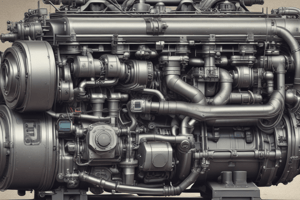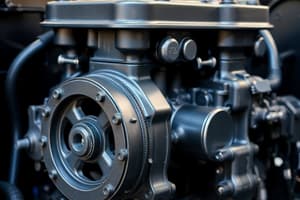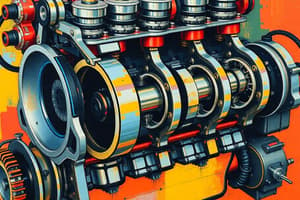Podcast
Questions and Answers
What is the major difference between diesel engines and gasoline engines?
What is the major difference between diesel engines and gasoline engines?
- Inlet valve action in diesel engines
- Use of a spark for ignition in diesel engines
- Fuel injection at high pressure in diesel engines (correct)
- Four-stroke cycle operation in diesel engines
During which stroke of the four-stroke compression ignition cycle does fuel injection begin?
During which stroke of the four-stroke compression ignition cycle does fuel injection begin?
- Compression stroke (correct)
- Exhaust stroke
- Power stroke
- Suction stroke
At what temperature does the fuel ignite in a diesel engine during compression?
At what temperature does the fuel ignite in a diesel engine during compression?
- Between 200 and 300°C
- Between 700 and 800°C
- Between 400 and 500°C
- Between 540 and 650°C (correct)
What action occurs just before the piston reaches top dead centre during the compression stroke?
What action occurs just before the piston reaches top dead centre during the compression stroke?
How is the temperature and pressure of the air affected during compression in a diesel engine?
How is the temperature and pressure of the air affected during compression in a diesel engine?
What happens during the Power Stroke in a two-stroke compression ignition engine?
What happens during the Power Stroke in a two-stroke compression ignition engine?
Why do two-stroke compression ignition engines have problems with exhaust gas scavenging?
Why do two-stroke compression ignition engines have problems with exhaust gas scavenging?
What is used to provide more complete scavenging and combustion air in two-stroke compression ignition engines?
What is used to provide more complete scavenging and combustion air in two-stroke compression ignition engines?
In a two-stroke compression ignition engine, what happens just before the piston reaches the top dead centre position?
In a two-stroke compression ignition engine, what happens just before the piston reaches the top dead centre position?
What is a common problem for two-stroke compression ignition engines in terms of drawing in combustion air?
What is a common problem for two-stroke compression ignition engines in terms of drawing in combustion air?
Study Notes
Diesel vs. Gasoline Engines
- Diesel engines use compression ignition, while gasoline engines rely on spark ignition.
- Diesel engines typically have higher thermal efficiency and torque at lower RPMs compared to gasoline engines.
Fuel Injection in Diesel Engines
- Fuel injection begins at the end of the compression stroke, just before the piston reaches top dead center (TDC).
Ignition Temperature in Diesel Engines
- The fuel in a diesel engine ignites due to heat generated by high compression, typically reaching ignition temperatures of around 400-500°C (752-932°F).
Piston Action at Top Dead Centre
- Just before reaching TDC during the compression stroke, high pressure and temperature conditions are met, which triggers fuel injection.
Effects of Compression on Air in Diesel Engines
- During compression, both temperature and pressure of the air increase significantly; this is essential for achieving the required ignition conditions.
Power Stroke in Two-Stroke Compression Ignition Engines
- During the Power Stroke, the combustion of fuel pushes the piston down, producing power in a single motion.
Exhaust Gas Scavenging Issues
- Two-stroke compression ignition engines face challenges with exhaust gas scavenging due to simultaneous intake and exhaust processes, which can lead to incomplete expulsion of exhaust gases.
Improving Scavenging and Combustion Air
- Turbochargers or superchargers are often used to enhance scavenging and ensure more complete combustion air delivery in two-stroke engines.
Piston Action in Two-Stroke Engines at Top Dead Centre
- Just before reaching TDC, the combustion chamber pressure rises, allowing for the expulsion of exhaust gases and the intake of fresh air.
Common Problem with Air Intake in Two-Stroke Engines
- A frequent issue is difficulty in adequately drawing in combustion air due to the overlapping action of intake and exhaust, which can result in reduced engine performance.
Studying That Suits You
Use AI to generate personalized quizzes and flashcards to suit your learning preferences.
Description
Test your knowledge of the operation of four-stroke diesel engines including the injection of fuel at high pressure and the absence of a spark for ignition. Understand the sequence of suction, compression, power, and exhaust strokes in this type of engine cycle.




